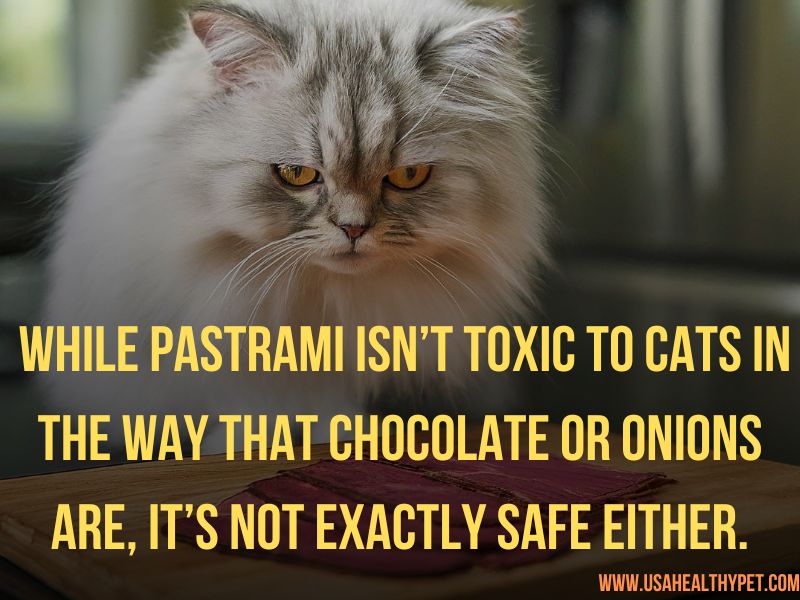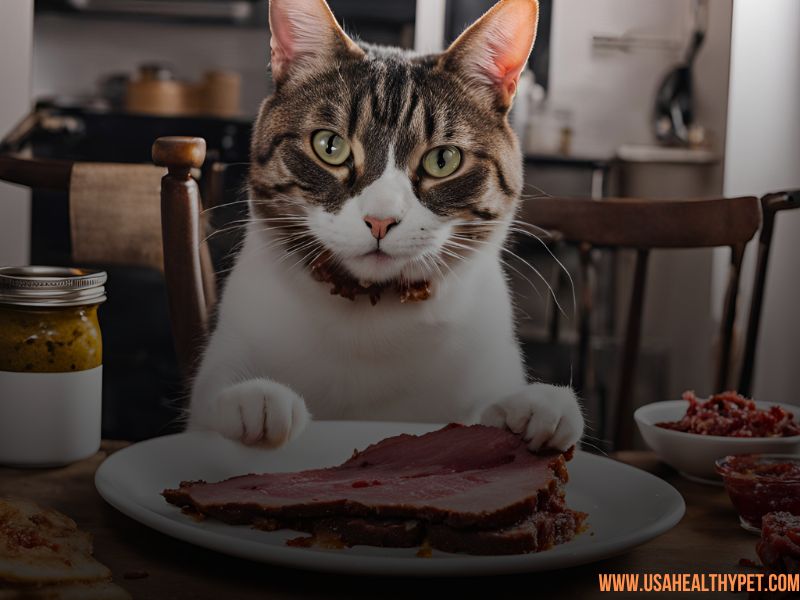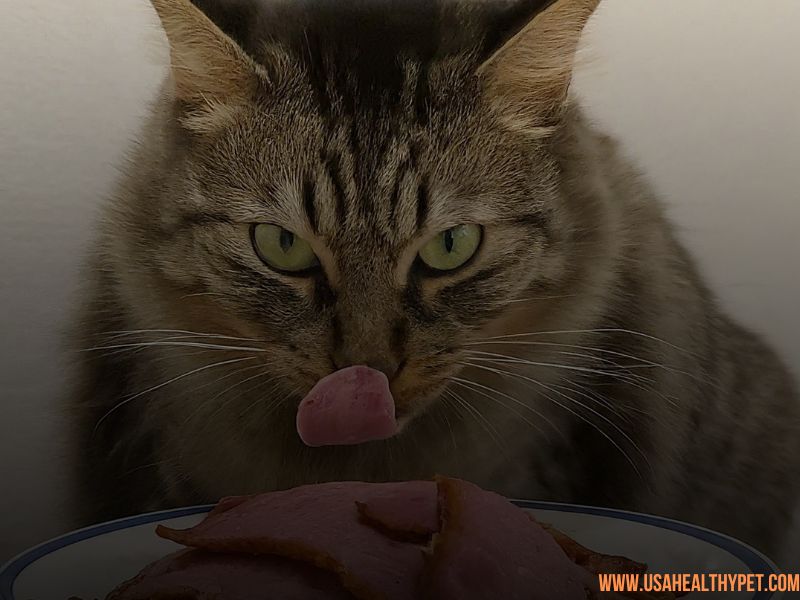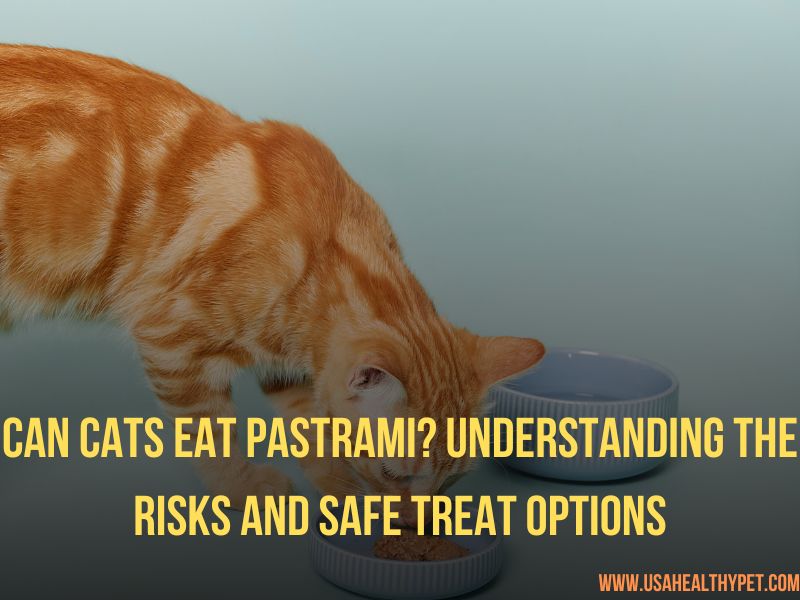Can cats eat pastrami? Yes, cats can eat pastrami because it is not toxic to them, but it should not be given as part of their regular diet.
Let’s explore why pastrami is not a safe snack for cats.
Key Points:
- Pastrami is not toxic to cats, but it’s unsafe due to its high salt, fat, and seasoning content.
- The salt in pastrami can lead to dehydration and, in severe cases, sodium ion poisoning.
- Garlic and onion often used in pastrami are toxic to cats, causing damage to red blood cells and leading to anemia.
- The high fat content increases the risk of obesity, pancreatitis, and heart disease.
- If your cat eats pastrami, watch for signs like vomiting, diarrhea, or lethargy and consult a vet if needed.
- Safe alternatives include plain, cooked meats like chicken, turkey, or fish—free of seasoning and bones.
- Always prioritize a balanced diet with high-quality cat food to meet their nutritional needs.
Is Pastrami Safe for Cats?
While pastrami isn’t toxic to cats in the way that chocolate or onions are, it’s not exactly safe either. Let’s break down the reasons why.
Salt Content
First off, pastrami is packed with salt. Cats don’t need much salt in their diet—certainly not as much as we do.
Too much salt can be harmful to cats, leading to issues like dehydration and even sodium ion poisoning in severe cases. So, giving your cat salty foods like pastrami could do more harm than good.
Spices and Seasonings
Another concern is the spices and seasonings used in pastrami. Garlic and onion, which are often used to season pastrami, are toxic to cats.
Even in small amounts, they can cause damage to a cat’s red blood cells, leading to anemia. Other spices might not be toxic but can still upset your cat’s stomach.

Fat Content
Pastrami is also quite fatty. While a little fat is necessary in a cat’s diet, too much can lead to obesity and other health issues like pancreatitis. Cats aren’t built to handle high-fat foods.
What Cats Need in Their Diet
Important Nutrients for Cats
Cats are obligate carnivores, meaning they need a diet that’s high in meat. To stay healthy, they require:
- Protein: Helps build muscles and provides energy.
- Taurine: A vital nutrient for heart and eye health.
- Fats: Important for healthy skin and fur.
- Vitamins and Minerals: Like vitamins A and D for overall health.
Giving your cat the right balance of these nutrients is key to keeping them happy and healthy.
Foods Cats Should Avoid
Not all foods are safe for cats. Some can be harmful or even toxic, including:
- Onions and Garlic: Can cause serious health issues like anemia.
- Chocolate and Caffeine: Dangerous for their heart and nerves.
- Grapes and Raisins: Can lead to kidney failure.
- Salty Foods: These can cause dehydration and other problems.
Knowing what to avoid is crucial when deciding what to share with your cat.
Potential Health Risks of Feeding Pastrami to Cats
Even if your cat only eats a small amount of pastrami, there are potential health risks that you should be aware of.
Dehydration
The high salt content in pastrami can lead to dehydration. Cats are notorious for not drinking enough water as it is, so adding extra salt to their diet can quickly lead to problems.
Dehydration in cats can cause lethargy, constipation, and even kidney issues.

Upset Stomach
Cats have sensitive stomachs, and the rich, spicy nature of pastrami might not sit well with them.
If your cat has eaten pastrami, you might notice symptoms like vomiting, diarrhea, or a general sense of discomfort.
No one wants to see their pet in pain, especially when it’s avoidable.
Long-Term Health Issues
Consistently feeding your cat inappropriate foods like pastrami can lead to long-term health problems.
Obesity, high blood pressure, and heart disease are just a few of the potential issues.
Additionally, the spices and seasonings could cause ongoing digestive problems or, in severe cases, toxicity.
What to Do If Your Cat Eats Pastrami
So, what should you do if your cat sneaks a piece of pastrami? Don’t panic. A small amount is unlikely to cause serious harm, but you should monitor your cat closely.
Watch for any signs of an upset stomach or unusual behavior. Make sure your cat has access to plenty of fresh water, as they may become thirsty due to the high salt content.
If you notice any concerning symptoms, such as vomiting, diarrhea, or lethargy, it’s best to contact your vet for advice.

Healthy Alternatives to Pastrami for Cat
Cooked Meats
If you want to give your cat a treat, try cooked meats like:
- Chicken Breast: Cooked without any seasoning.
- Turkey: Another good source of protein.
- Fish: Like salmon or tuna, cooked and free of bones.
These options are tasty and safe for your cat.
Store-Bought Cat Treats
There are many cat treats available that are both yummy and healthy. Look for:
- Real Meat: As the main ingredient.
- Grain-Free: Good for cats with food sensitivities.
- Dental Benefits: Some treats help clean teeth and keep gums healthy.
Always pick treats that match your cat’s age and health needs.
Homemade Cat Snacks
Feeling creative? You can make homemade cat treats with simple ingredients. Try:
- Tuna Bites: Mix canned tuna with an egg and bake.
- Chicken Jerky: Thinly slice chicken breast and bake until it’s chewy.
- Pumpkin Snacks: Combine pumpkin with oats for a healthy treat.
Making treats at home lets you control exactly what goes into them, keeping your cat’s diet safe and healthy.
Tips for a Healthy Cat Diet
Proper Portions
Feeding your cat the right amount of food is key to avoiding weight and health issues. Here’s how:
- Follow Guidelines: Based on your cat’s size and activity level.
- Measure Portions: Use a measuring cup to avoid overfeeding.
- Monitor Weight: Check your cat’s weight regularly and adjust portions as needed.
Giving the right portions will keep your cat healthy and happy.
Variety in the Diet
Cats like consistency, but a bit of variety can make meals more interesting:
- Rotate Proteins: Like chicken, turkey, and fish.
- Try New Textures: Such as chunks, or shreds.
- Add Safe Extras: Like small amounts of cooked veggies (e.g., carrots or peas).
Always introduce new foods slowly to see how your cat reacts.
Keeping an Eye on Your Cat’s Health
Regularly checking on your cat’s health and eating habits is important to make sure their diet is working for them:
- Vet Visits: Schedule regular check-ups.
- Watch Eating Habits: Notice any changes in how much or how little they eat.
- Check for Allergies: Be on the lookout for signs of food sensitivities.
Keeping tabs on your cat’s health can help you catch problems early and keep them well.
Conclusion:
In short, it’s best to keep the pastrami to yourself. While a small amount might not cause immediate harm, the potential risks outweigh any benefits.
If you really want to share a treat with your cat, stick to options that are specifically designed for them or safe alternatives like plain, cooked meats.
Remember, your cat’s health is in your hands, and it’s always better to be safe than sorry.
FAQs
1. Can cats eat other types of deli meats?
While some deli meats might be safer than others, most are still high in salt and spices. It’s generally best to avoid giving your cat deli meats altogether.
2. What happens if my cat eats a lot of pastrami?
If your cat consumes a large amount of pastrami, you should monitor them closely for signs of illness, such as vomiting, diarrhea, or lethargy. Contact your vet if you notice any concerning symptoms.
3. Are there any meats that are safe for cats?
Yes, plain, cooked meats like chicken, turkey, and fish are generally safe for cats to eat in moderation. Avoid seasoning these meats with salt, garlic, or onion.
4. Can pastrami cause long-term health problems in cats?
Regular consumption of pastrami could lead to long-term health issues such as obesity, heart disease, and high blood pressure due to its high salt and fat content.
5. How can I make sure my cat is getting the right nutrients?
Feed your cat a high-quality commercial cat food that’s specifically designed to meet their nutritional needs. Consult your vet if you’re unsure about what’s best for your cat.

Pingback: Can Cats Get Mononucleosis? What You Need to Know